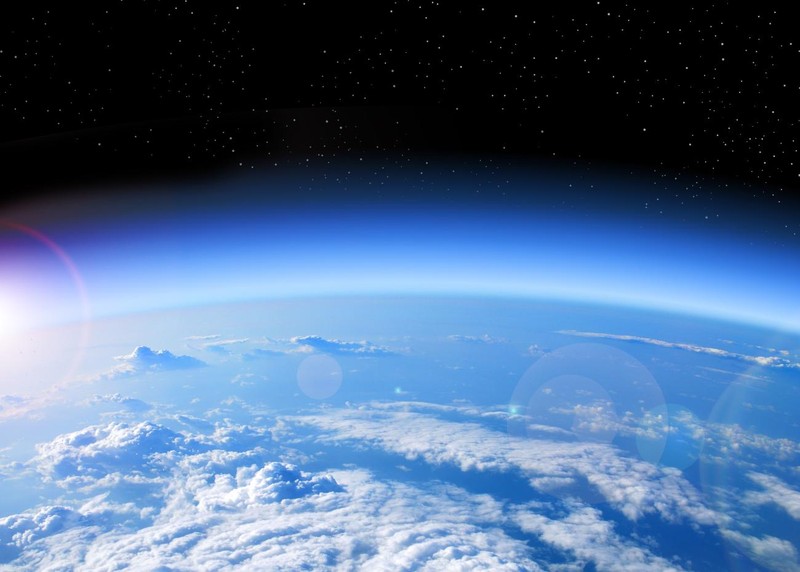During the past 30 years of participating in the Vienna Convention for the Protection of the Ozone Layer and the Montreal Protocol on Substances that Deplete the Ozone Layer, Vietnam has made efforts to synchronously implement various mechanisms, policies and solutions to manage and eliminate ozone-depleting substances, and has achieved some encouraging results.

Vietnam has taken concrete steps to protect the ozone layer. (Photo: JHU)
The ozone layer is a layer in the earth’s stratosphere that acts as a filter for the earth’s atmosphere, blocking up to 99% of ultraviolet radiation from the sun, helping to minimise dangerous radiation to the earth's surface and living organisms.
If the ozone layer is depleted, a large amount of ultraviolet radiation will hit the earth directly, and humans will be at risk of skin cancer, while plants and marine life will gradually lose their immunity and suffer damage and death.
In 1985, the Vienna Convention for the Protection of the Ozone Layer was adopted as the first international legal framework for the protection of the ozone layer, paving the way for countries to take strong action to reduce ozone-depleting substances radically. The Montreal Protocol on Substances that Deplete the Ozone Layer was also issued in 1987 and came into effect on January 1, 1989.
After 30 years of participating in the Vienna Convention and the Montreal Protocol, Vietnam has been internationally recognised as an active and highly responsible member, which has made multiple efforts to manage and eliminate ozone-depleting substances and greenhouse gases, and has achieved many important results.
To date, Vietnam has completely eliminated CFCs, halons, CTCs and HCFCs used in foam production and strictly controls the substances under the Montreal Protocol. Methyl bromide is only used for disinfection purposes.
For HCFCs and HFCs, which are common in refrigeration, Vietnam will gradually reduce their use and phase them out, with the goal of stopping the import of HCFCs by 2040 and eliminating 80% of HFC consumption by 2045.
According to statistics released by the Ozone Secretariat at its July 2024 meeting, Vietnam has eliminated consumption equivalent to 220 million tonnes of CO2 since joining the Vienna Convention.
Dr Tang The Cuong, Director of the Department of Climate Change under the Ministry of Natural Resources and Environment, said that in the first decade of participating in the Vienna Convention and the Montreal Protocol (1994-2004), Vietnam began to develop and promulgate regulations on managing and controlling the use of ozone-depleting substances. During that period, Vietnam also supported businesses in switching technology to eliminate ozone-depleting substances.
During the 2004-2014 period, Vietnam stepped up the protection of the ozone layer by issuing many regulations to manage the import and export of substances, control refrigeration equipment using CFCs, and restrict the establishment or expansion of businesses using HCFCs.
From 2014 to present, Vietnam has made strong progress in protecting the ozone layer by establishing management and implementation regulations.
In 2019, the Vietnamese government ratified the Kigali Amendment to the Montreal Protocol to strengthen the management of greenhouse gases (HFCs) used to replace the ozone-depleting substances that are being phased out.
The content of ozone layer protection was included in the 2020 Law on Environmental Protection and detailed regulations guiding its implementation.
Recently, on June 11, 2024, the Prime Minister issued a national plan on the management and elimination of ozone-depleting substances and greenhouse gases.
If the measures are implemented according to the roadmap, by 2045 Vietnam will reduce emissions by more than 11 million tonnes of CO2 equivalent from eliminating controlled substances, not to mention the amount of emission reduction achieved through efforts to switch to climate-friendly technology and the recycle and reuse of controlled substances, contributing to the goal of achieving net zero emissions by 2050.
Le Cong Thanh, Deputy Minister of Natural Resources and Environment, stated that in order to implement international commitments on the protection of the ozone layer, Vietnam needs to continue fine-tuning its institutions and policies on controlled substances, facilitate the switch to climate-friendly technology, and improve the energy efficiency of refrigeration equipment.
At the same time, it is necessary to step up international cooperation to implement international initiatives effectively and mobilise international support to carry out national programmes.